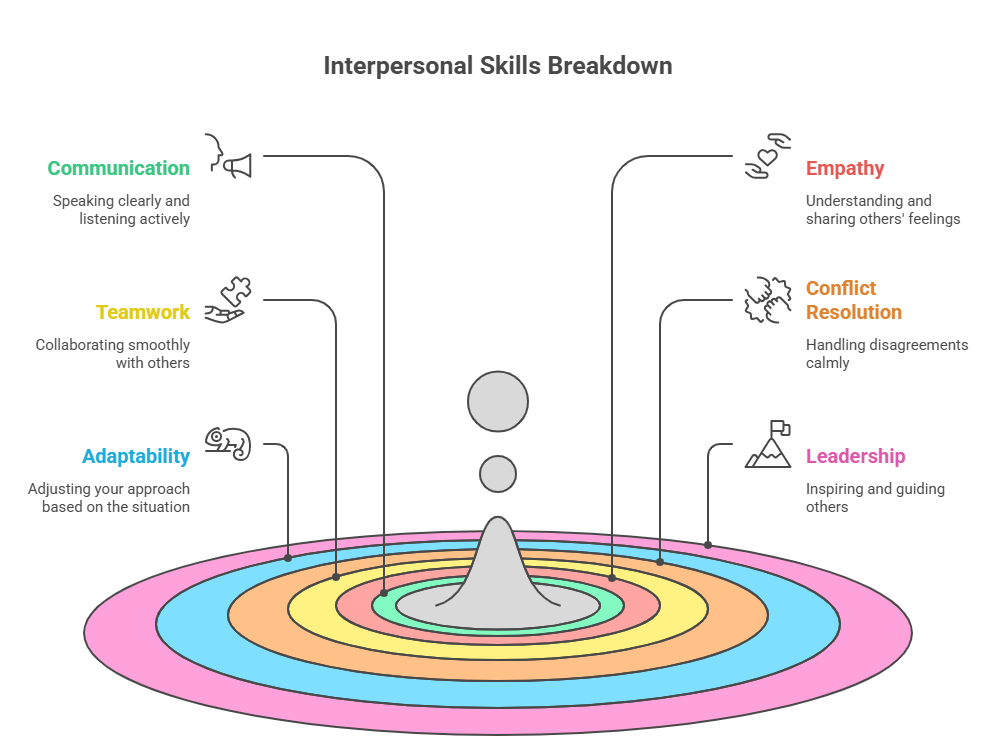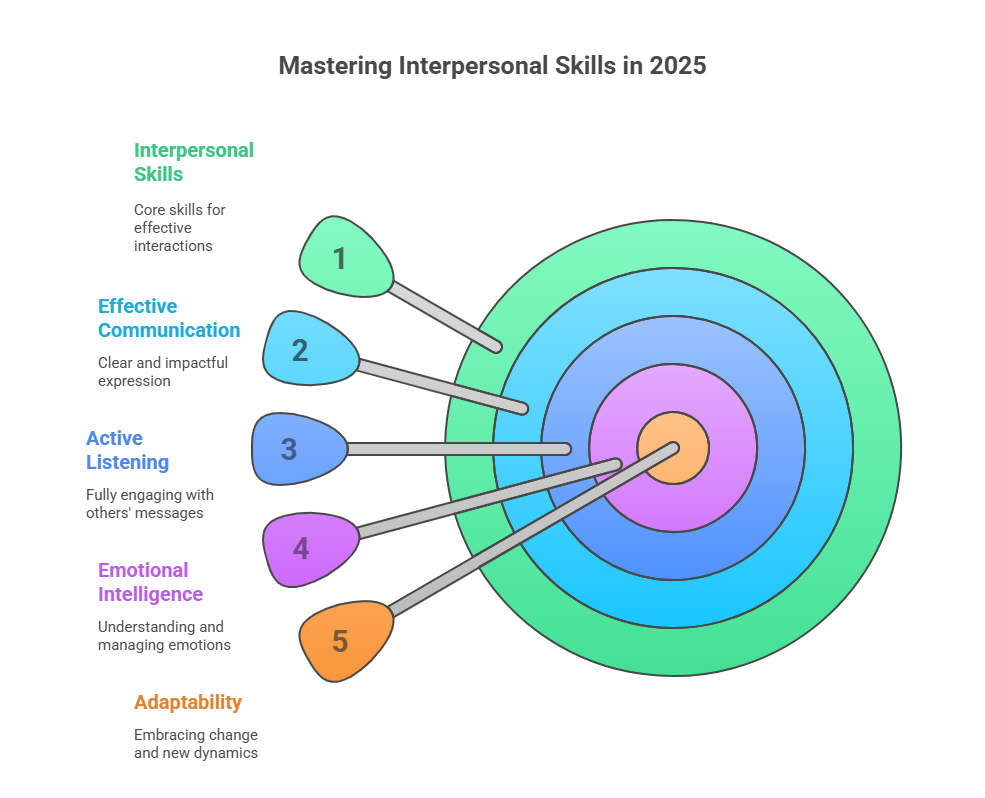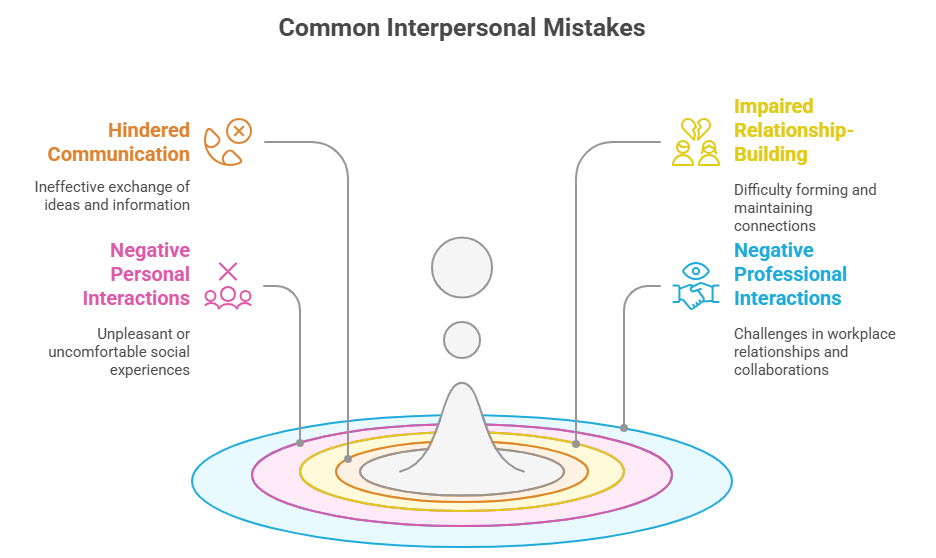Interpersonal skills—those soft, human-centered abilities that help you connect, communicate, and collaborate—are more critical than ever in 2025. Whether you’re aiming to land a dream job, strengthen workplace relationships, or simply build better connections in your personal life, these skills are the glue that holds it all together. But what exactly are interpersonal skills, and how can you sharpen them to stand out in a world that’s increasingly digital yet still deeply human? Let’s break it down in a way that speaks to you, addresses your challenges, and gives you practical steps to shine.
Why Interpersonal Skills Matter in 2025

You’ve probably been in a situation where a conversation went south, a team project stalled, or a networking opportunity fizzled out. Maybe you felt misunderstood, or you struggled to get your point across. These are the moments where interpersonal skills make all the difference. In 2025, with remote work, hybrid teams, and AI tools shaping how we interact, the ability to connect authentically is a game-changer.
Many of us feel rusty. Social isolation during past global events, combined with screen-heavy communication, has left people craving genuine connection but unsure how to rebuild those skills. Plus, the job market is fierce—employers are prioritizing candidates who can communicate clearly, resolve conflicts, and work well in teams.
According to a 2024 LinkedIn study, 92% of hiring managers value soft skills like communication and empathy as much as, or more than, technical expertise. So, whether you’re a recent grad, a seasoned professional, or someone looking to improve personal relationships, mastering interpersonal skills is your ticket to success.
What Are Interpersonal Skills, Exactly?

Interpersonal skills are the abilities that help you interact effectively with others. Think of them as the tools you use to build trust, share ideas, and navigate social situations. They include:
- Communication: Speaking clearly, listening actively, and reading non-verbal cues.
- Empathy: Understanding and sharing others’ feelings to build stronger connections.
- Teamwork: Collaborating smoothly with others to achieve common goals.
- Conflict Resolution: Handling disagreements calmly and finding solutions.
- Adaptability: Adjusting your approach based on the person or situation.
- Leadership: Inspiring and guiding others, even if you’re not the boss.
These skills show up everywhere—whether you’re negotiating a raise, calming an upset coworker, or bonding with a friend over coffee. The catch? They’re not always natural. If you’ve ever felt awkward in a group setting or struggled to express yourself, you’re not alone. The good news is that these skills can be learned and improved with practice.
Why Interpersonal Skills Feel Hard
Let’s get real—honing interpersonal skills isn’t always easy. Here are some common struggles you might face:
- Social Anxiety: Feeling nervous or self-conscious in conversations, especially with new people.
- Miscommunication: Saying one thing but being misunderstood, or struggling to read others’ intentions.
- Conflict Avoidance: Shying away from tough conversations to keep the peace, only to let issues fester.
- Digital Overload: Relying on texts or emails, which can feel impersonal and lead to misunderstandings.
- Time Constraints: Feeling too busy to invest in relationships or practice new skills.
These challenges can make you feel stuck, but they’re not insurmountable. With the right strategies, you can turn these pain points into opportunities for growth.
How to Master Interpersonal Skills in 2025
Ready to level up? Here are practical, actionable steps to build your interpersonal skills and tackle those pain points head-on. These tips are designed to fit into your busy life and make a real difference.
1. Sharpen Your Communication Skills
Clear communication is the cornerstone of interpersonal success. Whether you’re presenting an idea at work or catching up with a friend, how you express yourself matters.
- Practice Active Listening: Ever been in a conversation where the other person seemed distracted? Don’t be that person. Show you’re engaged by nodding, maintaining eye contact, and summarizing what they’ve said (“So, you’re saying…”). This builds trust and prevents miscommunication.
- Be Clear and Concise: Avoid jargon or overly complex words. If you’re explaining something, break it down like you’re talking to a friend. For example, instead of saying, “We need to realign our strategic priorities,” try, “Let’s focus on what’s most important right now.”
- Mind Your Body Language: Your posture, facial expressions, and tone speak louder than words. Practice open body language—uncross your arms, smile genuinely, and lean slightly toward the person you’re talking to.
Pro Tip: Try recording yourself during a mock conversation or presentation. Watch it back to spot areas for improvement, like filler words (“um,” “like”) or closed-off body language.
2. Build Empathy to Connect on a Deeper Level
Empathy is about putting yourself in someone else’s shoes. It’s a superpower for building trust and resolving conflicts, especially in tense situations.
- Ask Open-Ended Questions: Instead of “Did you have a good day?” ask, “What was the best part of your day?” This invites deeper responses and shows you care.
- Validate Feelings: If a coworker is stressed, say something like, “That sounds really tough. How can I help?” Acknowledging their emotions builds rapport.
- Practice Perspective-Taking: Before reacting to someone’s behavior, pause and consider their point of view. Maybe your boss snapped because they’re under pressure, not because they’re upset with you.
Pro Tip: Keep a journal to reflect on daily interactions. Write down moments where you connected well (or didn’t) and what you learned about the other person’s perspective.

3. Strengthen Teamwork and Collaboration
In 2025, teamwork is more dynamic than ever, with hybrid and remote setups requiring extra effort to stay connected.
- Be a Team Player: Offer to help a struggling colleague or share credit for group wins. Small gestures like these build trust and make you someone others want to work with.
- Clarify Roles and Goals: Misaligned expectations can derail a team. Early on, ask, “What’s everyone’s role here?” or “What are we aiming to achieve?” to keep everyone on the same page.
- Use Collaborative Tools Wisely: Tools like Slack or Microsoft Teams are great, but they can feel impersonal. Add a personal touch by using emojis, sharing quick voice notes, or scheduling short video check-ins.
Pro Tip: Set up a weekly “virtual coffee” with your team to chat about non-work topics. It’s a low-pressure way to build camaraderie.
4. Master Conflict Resolution
Disagreements are inevitable, but handling them well sets you apart. Instead of avoiding conflict, approach it with confidence.
- Stay Calm and Respectful: If tensions rise, take a deep breath and keep your tone neutral. Avoid personal attacks—focus on the issue, not the person.
- Find Common Ground: Start by acknowledging shared goals. For example, “We both want this project to succeed, so let’s figure out how to make it work.”
- Seek Win-Win Solutions: Propose ideas that address everyone’s needs. If a coworker wants a deadline extension but you’re pressed for time, suggest splitting tasks to lighten the load.
Pro Tip: Practice role-playing tough conversations with a friend. It’s a safe way to test your approach and build confidence.
5. Embrace Adaptability
In a fast-changing world, being flexible is key. Whether it’s adjusting to a new team dynamic or switching communication styles for different personalities, adaptability keeps you relevant.
- Learn to Read the Room: Pay attention to cues like tone, energy, or body language to gauge how others are feeling. If someone seems disengaged, pivot to a more engaging topic or ask for their input.
- Stay Open to Feedback: If a colleague suggests a better way to approach something, thank them and give it a try. It shows you’re open-minded and willing to grow.
- Experiment with New Tools: With tech evolving fast, being comfortable with new platforms (like AI-driven collaboration tools) can make you a go-to person in your circle.
Pro Tip: Challenge yourself to try one new communication style each week—like being more direct or softening your tone—and see what works best.
You Must Read
Understanding Workplace Skills Gaps: Top 10 Examples You Need to Know
Marketing Skills You Must Have for Career Growth
Overcoming Obstacles: Solutions to Common Challenges
Let’s revisit those pain points and tie them to solutions:
- Social Anxiety: Start small. Practice one-on-one conversations before tackling group settings. Apps like Meetup can help you join low-pressure social events to build confidence.
- Miscommunication: Double-check understanding by summarizing key points in emails or meetings. For example, “Just to confirm, you need this by Friday, right?”
- Conflict Avoidance: Prep for tough talks by writing down your main points. This keeps you focused and less likely to shy away.
- Digital Overload: Balance digital communication with face-to-face or voice interactions when possible. Even a quick phone call can feel more human than a text.
- Time Constraints: Dedicate just 10 minutes a day to practice one skill, like active listening or asking better questions. Small, consistent efforts add up.
Why Mastering Interpersonal Skills in 2025 Is Worth It
Investing in your interpersonal skills pays off in ways that go beyond the workplace. You’ll build stronger relationships, feel more confident in social settings, and become someone others naturally gravitate toward. In 2025, as the world leans into hybrid work and digital tools, the ability to connect authentically will set you apart. Employers, friends, and even family will notice the difference when you communicate clearly, show empathy, and handle challenges with grace.
Common Interpersonal Skills Mistakes to Avoid

Over-Talking and Under-Listening
Many professionals mistake talking frequently for communicating effectively. The most impactful communicators spend more time listening than speaking.
They ask thoughtful questions, seek to understand before being understood, and create space for others to contribute.
Assuming Intent
Jumping to conclusions about others’ motivations or feelings creates unnecessary conflicts and misunderstandings.
Instead, ask clarifying questions and give people the benefit of the doubt while gathering more information.
Neglecting Non-Verbal Communication
Inconsistency between words and body language confuses recipients and undermines your message.
Pay attention to your posture, facial expressions, and tone to ensure they align with your intended message.
Avoiding Difficult Conversations
Postponing challenging discussions typically makes situations worse and damages relationships.
Address issues promptly and directly while maintaining respect for the other person.
One-Size-Fits-All Communication
Using the same communication approach with everyone ignores individual preferences and cultural differences.
Adapt your style based on the situation, audience, and desired outcome.
Taking Everything Personally
Workplace interactions aren’t always about you. Others may be stressed, distracted, or dealing with issues you’re unaware of.
Maintain perspective and don’t internalize every interaction as a reflection of your worth or abilities.
FAQs: People Also Ask
1. Can interpersonal skills be learned?
Yes! While some people are naturally more social, anyone can improve with practice, feedback, and self-awareness.
2. How do interpersonal skills affect workplace productivity?
Strong interpersonal skills reduce miscommunication, foster teamwork, and create a positive work environment—all boosting efficiency.
3. What’s the difference between interpersonal and intrapersonal skills?
Interpersonal skills involve interactions with others (communication, teamwork), while intrapersonal skills are internal (self-awareness, motivation).
4. Why do employers prioritize interpersonal skills?
They lead to better collaboration, leadership, and customer relations—key drivers of business success.
5. How can I demonstrate interpersonal skills in a job interview?
- Maintain eye contact.
- Listen carefully before answering.
- Share examples of teamwork or conflict resolution.
Your Next Steps
Ready to get started? Pick one skill to focus on this week—maybe active listening or conflict resolution—and practice it daily. Track your progress in a journal or share your goals with a friend for accountability. You don’t need to overhaul your personality; small, intentional changes will lead to big results.
What’s one interpersonal skill you want to improve in 2025? Try these tips, and you’ll be amazed at how quickly you can grow. Keep at it, and soon, you’ll be the person everyone wants on their team—or at their dinner table.
